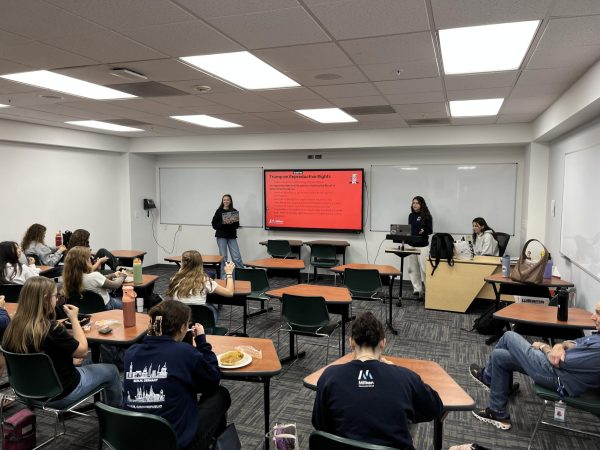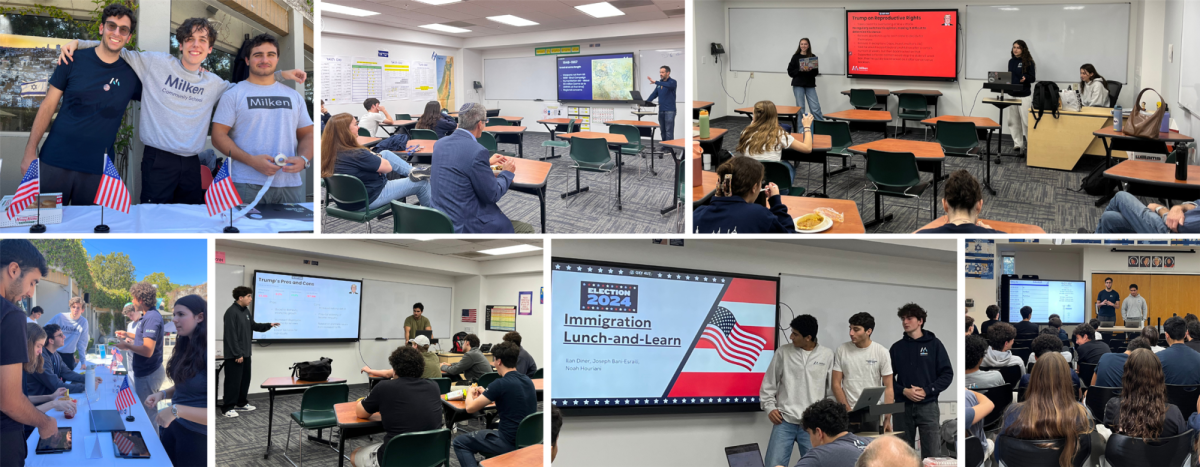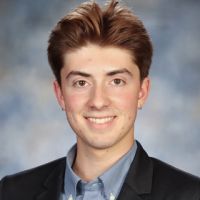On the morning of November 6th 2024, Milken’s campus felt like a microcosm of America. Many students proudly wore their bright red “Make America Great Again” hats, excitedly discussing the results of the presidential election from the night before in which Donald Trump won the electoral college by a wide margin and the popular vote by over 2 million. This celebratory mood did not extend to all students, however. For Kamala Harris supporters, the mood was subdued and quiet, as they kept their heads down and simply tried to make it through the day.
Milken, like the rest of the country, is a politically diverse community with significant Republican and Democratic contingents within the student body. With the increasing polarization of society and the heightened emotions surrounding this year’s presidential election, it seemed more important than ever to have educational programming about the election.
This year’s election programming, spearheaded by the Civics and Debate Club (C&D), aimed to unite rather than divide. Co-Presidents David M. (‘25), Allen D. (‘25), and Noah K. (‘25) created this program with advising support and facilitation from Dr. Dooley, Milken’s Social Science Instructional Leader.
“Noah, Allen, [and I] pitched a revamped election program to the administration this year,” David said. This included a “voter registration drive, ‘Lunch-and- Learns’, and speaking to the middle school about Proposition 32 and the California Proposition system.”
Dr. Dooley added that “I really wanted to focus on not highlighting our differences but really fostering machloket which means civil dispute and constructive disagreement.”
The organizers intentionally made the programming different from years past. Dr. Dooley said that, in previous times, “One event that took place was a mock election and so students could cast their own votes. We are a divided campus politically… Instead of showing our differences, we were thinking about what unites us and [about] having those conversations.”
The first event to take place happened over four days in October and offered a chance to guide students through the voter registration process. It led to approximately 70 students’ registering to vote, both those eligible to vote in this most recent election and those who are not yet 18. Andrew P. (‘25) was one such student who registered to vote at Milken.
“The process was fairly easy,” he said. “I just went on the iPad they gave me; I put in all my information; put in the party that I would be voting for, and shortly after an email was sent to me. A couple days later the ballot was mailed to me at my house…It felt like a step towards adulthood.”
Next up came a series of “Lunch-and-Learns” in which students led informational sessions on pressing issues, including reproductive rights, immigration, and the Israel-US alliance.

David M., one of the student-leaders said, “We wanted to create a policy discussion that was realistic, that helped students decide between the two options, rather than forming an opinion that might have difficulty slotting into what the American political landscape looks like currently.”
In practice, this meant that the student presenters introduced the issue, shared both then candidate Harris’ and Trump’s views, and then opened it up to discussion and debate.
At the reproductive rights “Lunch-and-Learn” Girl Talk members Samantha S. (‘25), Reese D. (‘25), and Camilla Z. (‘27) led, students, teachers, and administrators alike filled the classroom, eager to engage in this discussion.
“We started with going over the Roe v. Wade case and then how that was overturned in the Dobbs decision,” Samantha S said. “Then we went over more in depth about what each presidential candidate thinks about those decisions surrounding abortion…We were trying to be very unbiased and informative on what th[ose] two candidates think, especially because some of the seniors are voting.”
Finally, C&D finished off Election Programming with an event at the middle school for 8th graders about the unique California proposition system which included a debate about Proposition 32, one that aimed to increase the minimum wage (from $16/hr to $18/hr).
“We held a 15-20 minute debate where we talked about the pros and cons [of] Proposition 32 in front of 60-70 kids,” David M. explained. “You have kids you literally have to quiet down because they’re so ready to discuss [these issues]. It’s the nature of Civics & Debate where we want everyone to form their own perspective. and I think we did a pretty decent job at that.”
Though the Milken community’s political views may lie across a wide spectrum, and may stay that way for the foreseeable future, the election programming provided an important space for people of differing political opinions to come together and learn from each other, a powerful message during a polarized national and global time.




